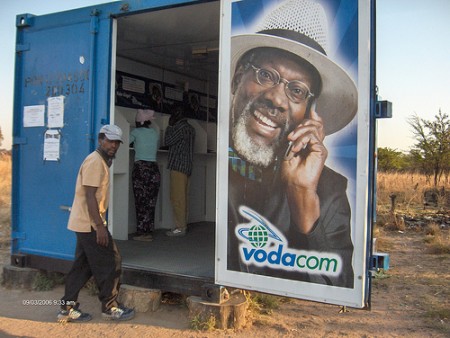
They are among the most underdeveloped countries in the world. Only a minority of their people has access to electricity. Clean drinking water remains a distant dream. Many of their children continue to die of diseases that have long become extinct here in the West or are easily preventable.
But in one area, developing countries are clearly ahead of the industrialized world: the use of mobile phone applications.
Three-quarters of the world’s mobile phones are believed to be owned by people in developing countries.
In Africa, more people own mobile phones (37 percent) than have access to electricity (25 percent). (Note: Phones are often charged using rather ingenious methods, such as old car batteries). According to one estimate, about a billion people, most of them in the developing world, don’t have a bank account but – guess what? – own a cell phone.
There are a couple of innovative uses of these cheap mobile devices that are making the lives of millions of people in developing countries easier. Mobile phones keep people better informed, help them combat dishonest practices and assist them at earning more money. They sometimes even help save lives.
Mobile phones take on the role of bank accounts in countries where most people have no access to banking. Safaricom’s M-PESA product and Nokia’s NokiaMoney allow users to use their cell phones as debit cards and to transfer money to their families via SMS. This saves those who work in large cities and send money to their families in the countryside from having to make multiple trips back home, which can be dangerous and time consuming.
In Afghanistan, which remains in essence a cash economy, the introduction of cell phone banking is considered an effective way to fight corruption. When cash is handed out, superiors often help themselves to part of their subordinates’ pay. If salaries can be transferred directly to people’s cell phones, the money no longer has to travel through corrupt hands. Similarly, customs fees collected at Afghanistan’s borders would no longer have to pass through different officials before (or if ever) the collected monies make it to Kabul.
While we in the West are just starting to discover the value of portable devices in journalism (and we waited till the advent of fancy iPhones), Africans have been using mobile phones to broadcast news for a while. In Africa, where internet access is scarce, subscribing to text messages sent out by news outlets has become the preferred way of keeping up with the latest headlines. The innovative website Ushahidi, developed for use in Kenya during the political disturbances of 2008, is a platform for gathering and crowdsourcing information sent in by citizen journalists via SMS (or other channels).
But of course, also the more traditional use of the cell phone (i.e., making a simple phone call from places where no land line exists) proves to be invaluable for people in developing countries. In the area of health, cell phones have become real life savers. In one remote village in Ghana, cell phones have shown themselves to be pivotal at drastically reducing the death rate of women giving birth. Whenever complications during childbirth occur, help from a qualified doctor now is only a phone call away.
Not surprisingly, the renowned development economist Jeffrey Sachs has called the cell phone “the single most transformative technology for development.” The good news: this “transformative technology” is also very inexpensive. Or perhaps I should rather say: Cell phones have become so transformative because they are so affordable to the poor.
It sometimes does not take that much to make a big difference in people’s lives.

